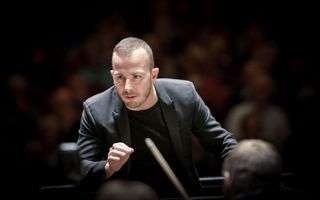|
Back
Leonore Triumphant Montreal
Maison symphonique de Montréal, Place des Arts
10/25/2019 - & October 27, 2019
Ludwig van Beethoven: Fidelio, opus 72
Lise Davidsen (Leonore), Michael Schade (Florestan), Luca Pisaroni (Pizarro), Raymond Aceto (Rocco), Kimy McLaren (Marcelline), Jean-Michel Richer (Jaquino), Alan Held (Fernando), Sylvain Paré, Jean-Philippe McClish (Prisoners)
Chœur de l’Opéra de Montréal, Orchestre Métropolitain, Yannick Nézet-Séguin (conductor)

Y. Nézet-Séguin (© Hans van der Woerd)
Some music lovers claim Beethoven was not at his best composing opera, especially when compared to his symphonic, chamber and piano output. Fidelio, Beethoven’s only opera, was one of the first operas I ever saw performed, and it has always appealed to me. Its libretto may not be the best constructed, but it has never failed to move me. The intrigue is convincing enough, and the characters well defined, but one could argue they don’t get a chance to adequately develop in the short lapse of time in which the action is supposed to occur. But never mind. Most importantly, the music is sublime. Sublime is also the most appropriate adjective to describe Norwegian soprano Lise Davidsen, This is a once-in-a-century type of voice like Joan Sutherland, Luciano Pavarotti, Astrid Varnay and fellow Norwegian Kirsten Flagstad. Her timbre is rich and gorgeously even throughout the vast register it covers. Effortless high notes, impeccable German diction and a riveting dramatic intensity are further qualities that Davidsen possesses. In Leonore’s big aria “Abscheulicher,” one was awestruck by her voice and utterly moved by the intensity of emotion. One almost wished this had been a recital to hear only this incredible soprano – she is that spellbindingly marvelous. However, the score to Fidelio is wonderful and there were also two other exceptional singers in this production: Luca Pisaroni and Raymond Aceto.
Luca Pisaroni was an imposing Don Pizarro, rightfully menacing and arrogant, but blissfully, not excessively so, a pitfall for many in this role. As usual with this exceptional singer, his role completely enveloped him, and his acting was utterly convincing. His beautiful voice was adjusted to convey the evil nature of the character. As for his diction, the Vienna-based Italian bass-baritone’s German is impeccable. He could probably teach German elocution to native speakers. American baritone Aceto was the third great singer in this concert performance. Though one would have wished for a deeper bass to contrast more sharply with Pisaroni’s voice and to convey the buffo side of the role, Aceto managed to portray an appropriately avuncular and amiable Rocco with all the foibles of the jaded jailor. He excelled in the Act 1 “Gold” aria, “Hat man nicht auch Gold beineben”, thanks to his rich bass as well as a natural comic verve. Veteran bass-baritone Alan Held was a noble Don Fernando despite some fatigue in his voice. Michael Schade was miscast as Florestan, the long-suffering imprisoned husband. This is a role for a dramatic tenor, not an aging lyric tenor. Nonethess, Schade was moving in his aria “Gott! welch ein Dunkel hier!” and sang with a clear German diction. The Marzelline, Kimy McLaren, has a decent voice but seemed under-rehearsed and out of place stylistically. Totally miscast was tenor Jean-Michel Richer as Jaquino, whose voice is too weak for this lyric tenor role. The diction of the latter two was atrocious. The first act quartet “Mir ist so wunderbar” is a glorious moment in the Mozartian style, akin to Così fan tutte’s Trio “Soave sia il vento.” Sadly, with a weak Jaquino and an average Marzelline, it was nowhere close to that.
L’Orchestre Métropolitain was well rehearsed and performed with panache under its beloved conductor Yannick Nézet-Séguin. The Leonore III overture was introduced before the opera’s final scene, a tradition started by Mahler and continued by some famous conductors such as Wilhelm Furtwängler and Bruno Walter. Despite my respect for these great conductors, introducing a long overture towards the end of the opera weakens the drama. Delaying the denouement in this case does not heighten the intensity but dissipates it. This is hopefully the beginning of a collaboration between L’Opéra de Montréal and L’Orchestre Métropolitain in giving operas in concert. Given this conductor’s international career, the Montreal public may be fortunate enough to hear such great voices, as they did in this performance, with greater frequency.
Ossama el Naggar
|